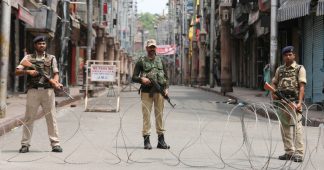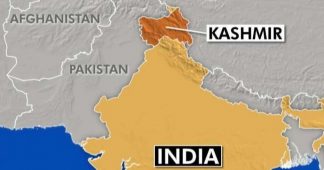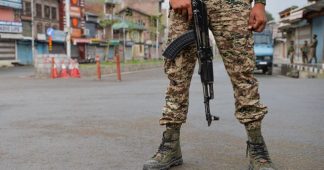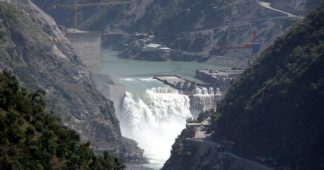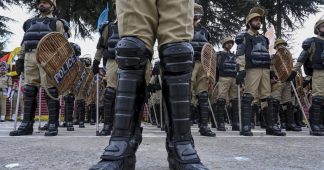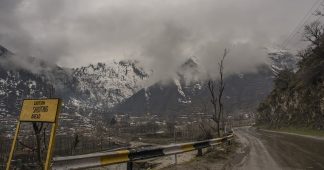The Algerian people’s struggle against colonialism replicates that of siege-weary Kashmiris
By Samreen Mushtaq, Mudasir Amin
30 October 2019
People of the Casbah, the FLN (the National Liberation Front) wants to stop you from working.” French soldiers, and young men are rushing forward on soldiers’ insistence.
“People of the Casbah, France is your motherland. The FLN wants to starve you and condemn you to poverty.” Anxious, waiting faces are looking for family members.
“People of the Casbah, resist the FLN’s orders.”
A young boy captures the microphone: “Algerians! Brothers! Take heart!” Baffled soldiers. The crowd erupts into a roar.
This powerful scene from the 1966 film The Battle of Algiers – in which a young boy calls on his countrymen to “take heart” in the face of French propaganda, during the Algerian people’s struggle against colonialism – is repeating itself today in Kashmir.
The Kashmiri people have been under siege since the Indian government this summer issued a decree stripping the region of its semi-autonomous status. Tens of thousands of additional troops have been deployed to the region; a communications blackout has descended; scores of people, including minors, have been arrested; and jails have already ran out of capacity.
Pushing propaganda
Amid this backdrop, the Indian state has worked hard to push propaganda defending its policy in Kashmir, while portraying the militant “Other” – backed by Pakistan, of course – as the abnormality. Earlier this month, a full-page government advertisement in local newspapers urged residents to restore normalcy and end the self-imposed shutdown that they have been practising in protest since government restrictions began to ease.
While Kashmir continues to live through the siege, the Indian state propaganda has also brought a group of 27 EU Parliamentarians – most of them from right-wing parties, to Kashmir.
From enjoying the picturesque Dal lake with state officials to a press conference where most local journalists were not allowed to attend, to their lack of engagement with the locals, the propaganda for a favourable public opinion seems to have turned into another disaster Public Relations stunt for the Indian State. One of the Parliamentarians claimed that he was disinvited after expressing his desire to meet with the locals without a police escort.
As was true of the French in Algeria and of colonial powers elsewhere, the Indian state and its cohorts in Kashmir assume that Kashmiris do not have the capability to think for themselves, instead requiring the coloniser to tell them what is best for them.
In another scene from The Battle of Algiers, the National Liberation Front (FLN) calls the UN debate on Algerian independence a “great victory for the people” and suspends its armed action for a week, which is also proclaimed as a general strike against the colonial regime. This finds a parallel in Kashmir’s civilian-imposed curfew, although the latter has been mostly spontaneous.
Despite the FLN’s optimism, the UN ultimately passes a resolution that rules out any direct intervention in Algeria and “hopes” for a fair solution. This has an uncanny resemblance to the current happenings in and around Kashmir.
Futile hopes
On 16 August, the UN Security Council held a closed-door consultation on Kashmir, which, despite the previous decades of inaction, Kashmiris celebrated as a victory. But the meeting concluded with no tangible outcome – not even a formal statement on what took place.
Kashmiris were again glued to their televisions and radios on 27 September, when Pakistani Prime Minister Imran Khan addressed the UN, emphatically impressing upon the world the need to resolve the Kashmir crisis. The futile hopes for definitive UN action expressed in The Battle of Algiers continue to be a hallmark of the Kashmiri situation as well.
Over the past few months, police and bureaucrats loyal to the state have rejected stories about the siege of Kashmir as inaccurate, but the government’s own call for Kashmiris to restore normalcy and resume business-as-usual punctures its broader narrative.
How is it that militants – who by the government’s own count number just a few hundred, and who are facing an arms shortage – could shut down a whole region? Why would normalcy need to be restored if Kashmiris were happy with the government’s decree on the region’s status? The state’s blocking of communications also reflects its ever-growing need to control and dehumanise Kashmiris.
On 14 October, after more than two months, limited mobile phone connectivity was restored in the region. Indian propaganda channels portrayed this as good news, signalling the government’s efforts to restore normalcy. That the same government brought everything to a standstill in the first place was deliberately forgotten.
Kashmir at a crossroads
While the communications clampdown has come under a global spotlight, forgotten are the thousands of Kashmiris who have been arbitrarily detained, the banning of the Jamaat-e-Islami sociopolitical organisation, and the harassment by Indian authorities of pro-freedom leaders and their families. Even more distant is the decades-long denial of Kashmiris’ rights, and the intensive militarisation that has seen more than 70,000 killed and thousands more subjected to enforced disappearance and torture, as part of the state’s counterinsurgency mechanism.
The Indian state has openly advocated a more muscular, militaristic policy in Kashmir. Today, Kashmiris are deeply concerned over the state’s attempt at a settler-colonial project, along the lines of Israel/Palestine. As the international coverage of Kashmir dies down, it is important not to forget the Kashmiri people’s long-standing demand for self-determination.
India will eventually restore all forms of communication and portray it as a favour bestowed upon the Kashmiri people. Yet, for the people who have witnessed unspeakable violence over the years, this will be remembered as another feature of the Indian state’s control over Kashmir.
We are at a crossroads: of collective memory against forgetfulness, of resistance to military control, of maintaining a homeland amid ongoing attempts to disintegrate it.
The Battle of Algiers does not fully account for the historical context of Algeria’s resistance. In Kashmir, that context has been even more totally erased, with the battle reduced to signals disappearing and reappearing on mobile phones.
* Samreen Mushtaq is a Kashmiri researcher currently based in New Delhi. Her work focuses on the gender dimension of state violence in Kashmir. She has previously worked as a research consultant at The Hindu Centre for Politics and Public Policy.
* Mudasir Amin is a Kashmiri researcher currently based in New Delhi. His research interests include humanitarian aid, NGOs and Kashmir. He has previously been associated as a Fellow with The Hindu Centre for Politics and Public Policy, Chennai, India.
Published at https://www.middleeasteye.net/opinion/battle-algiers-plays-out-again-kashmir
